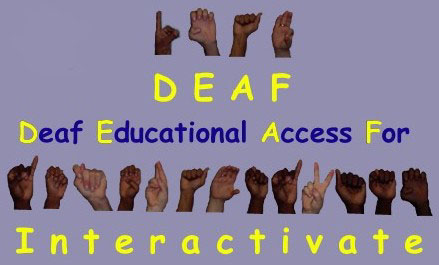 ASL | Functions as Processes or Rules Discussion: "Function Machines" |
 ASL | Mentor: We are going to study functions by using a model. This particular model closely resembles the way scientists think about functions. Let me draw a machine, which can be anything with two openings. The arrows show "In" and "Out" directions. |
 ASL | Student: What are the X and Y for? |
 ASL | Mentor: X and Y are traditional names for input and output, that is, for the numbers that we put into the machine and the number that the machine puts out. A number goes in, the machine does something to it, and another number comes out. The function machine does the same thing to every number. Sometimes we just call it "function" for short. |
 ASL | Mentor: This is how the machine works: the directions are written in a special code people use for functions. Let's use this special code for an example: Y = X + 2. |
 ASL | Mentor: So, what is your number? Student: 5. |
 ASL | Mentor (points to the equation): The function machine does something to 5, and out comes 7. Student: 12. |
 ASL | Mentor: In comes 12, out goes 14. |
 ASL | Student: It adds 2! |
 ASL | Mentor: You have revealed the secret of this function. See if you can read the mathematical language. |
 ASL | Student: Sure, Y is equal to X plus 2. |
 ASL | Mentor: Here is another machine. Try to find out what this one does! Give me some numbers. Student: 3. |
 ASL | Mentor: In comes 3, out goes 6. |
 ASL | Student: It adds 3! |
 ASL | Mentor: Try another number just to check. Student: 10. |
 ASL | Mentor: In comes 10, out goes 20. |
 ASL | Student (puzzled): 5. |
 ASL | Mentor: 10. |
 ASL | Student: Aha! I know this one. It is multiplying by 2. I would like to construct the next machine! |
 ASL | Mentor: Can you make a machine that describes something from your life? Maybe one about a recent price increase. If every price was raised 10%, what do I pay extra? |
 ASL | Student: Sorry, it is my turn! Mentor: Can you think of some other function machines? |

| |


Developed by
The Shodor Education Foundation, Inc.
Copyright © 2002 by The Shodor Education Foundation, Inc
This project is supported, in part, by the National Science Foundation
Opinions expressed are those of the authors and not necessarily
those of the National Science Foundation.
